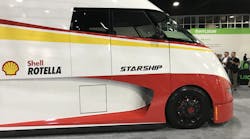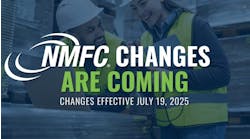It’s always great to have someone else verify your findings. Our Run on Less event last fall demonstrated that fuel efficiency way beyond the national average is possible with trucks using currently available technology operating on real routes and delivering real freight.
Shell’s Starship Initiative using a prototype Class 8 vehicle recently finished its coast-to-coast drive across the country in real-world trucking operations and in real-world conditions.
The results? Starship attained a NACFE verified 178.4 ton-miles per gallon freight ton efficiency. This equates to a 248% improvement over the North American average of 72 ton-miles per gallon. For those of you unfamiliar with freight ton efficiency it is calculated by taking the miles traveled divided by gallon of fuel consumed times the payload weight in tons.
The final total truck and cargo weight was close to 73,000 pounds; about 28% heavier than the average total gross vehicle weight is 57,000 pounds for U.S. on-highway Class 8 trucks.
The trip covered vastly different road, weather and terrain conditions but through it all Starship’s total average fuel consumption was 8.94 mph. The best fuel economy during the drive was 10.2 MPG, just a bit more than the Run on Less average of 10.1 Like I said earlier, it’s nice to have validation that your efforts were not a one off fluke.
One thing about the Starship truck is that it was equipped with a variety of technologies that have not yet been tested in the real world. Not all of them performed as anticipated and some didn’t make it on the truck in time for the coast to coast run. Examples include the gap closure not being deployed, grill shutters inoperable and some engine integration problems. The electric axle is yet to be installed. But the result was still impressive and with this “unfinished business” more performance can be achieved.
And Shell says it is not done yet and that it hopes to apply things learned from Starship’s first run and as their tagline says, “continue the conversation” on efficiency by making the truck a continuing rolling laboratory.
I for one am looking forward to it and I think Dave Schaller, NACFEs director of industry engagement and Yunsu Park, our engineering director are too. Dave followed the truck across the country to verify fuel use and Yunsu crunched all the telematics data coming from the truck. I’m sure they’d be happy to chat with you about lessons learned from this latest attempt to prove that as an industry we can do better — much better — when it comes to fuel efficiency and freight ton efficiency. And it’s pretty fun doing it.




